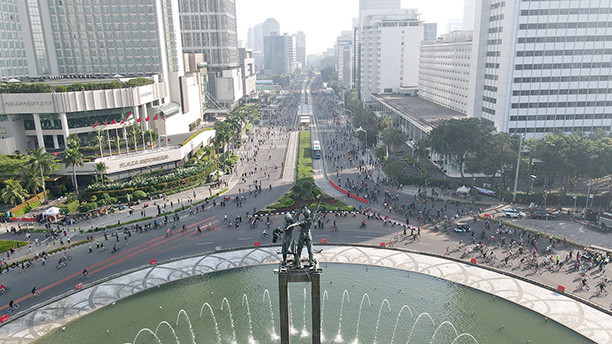Popular Reads
Top Results
Can't find what you're looking for?
View all search resultsPopular Reads
Top Results
Can't find what you're looking for?
View all search resultsIndonesia’s stimulus not enough for households to survive pandemic: Survey
Former finance minister Chatib Basri has said the government needs an additional Rp 120 trillion for cash transfers for lower-middle income citizens to jump-start the economy.
Change text size
Gift Premium Articles
to Anyone
 Jakartans take to the streets around the Hotel Indonesia traffic circle to exercise during Car Free Day (CFD) in this undated file photo. After having been suspended since March 15 amid the COVID-19 pandemic, the Jakarta administration has resumed the CFD along Jl. Sudirman and Jl. MH Thamrin with strict health protocol in place during the transition phase of the large-scale social restrictions (PSBB). (JP/Donny Fernando)
Jakartans take to the streets around the Hotel Indonesia traffic circle to exercise during Car Free Day (CFD) in this undated file photo. After having been suspended since March 15 amid the COVID-19 pandemic, the Jakarta administration has resumed the CFD along Jl. Sudirman and Jl. MH Thamrin with strict health protocol in place during the transition phase of the large-scale social restrictions (PSBB). (JP/Donny Fernando)
I
ndonesia’s stimulus packages are considered insufficient for households to survive the pandemic, a new survey shows, as economists call on the government to increase budget allocations to revive the virus-battered economy.
According to a new survey published on Monday by political campaign consultancy Cyrus Network, the majority of Indonesian respondents consider the government’s stimulus “not enough” to help them weather economic risks amid the pandemic.
“We still need a greater stimulus to boost the demand side of the economy,” University of Indonesia economist Ari Kuncoro told The Jakarta Post. The government should opt for “more creative incentives”, such as an internet subsidy for students and incentives for leisure activities.
The government’s stimulus to boost demand will be able to help micro, small and medium enterprises (MSMEs) hit hard by the pandemic and will further support economic recovery he said. “The MSMEs are now looking to get working capital loans to boost production, but they will need demand, which has been temporarily weakened by the pandemic,” Ari added.
The government has allocated Rp 695.2 trillion (US$47.66 billion) in funds to respond to the pandemic and bolster the economy, which, according to the Finance Ministry’s projection, will grow by only 1 percent this year or, in a worst-case scenario, may contract by 0.4 percent.
Several other economists have also called on the government to step up stimulus spending to boost demand, which in turn is hoped to boost the supply side of the economy.
Former finance minister Chatib Basri said recently that the government would need an additional Rp 120 trillion to serve as cash transfers for lower-middle income citizens to jump-start the economy.
The survey, which involved 1,230 individuals in 123 villages/districts of all 34 provinces, found that the majority of respondents are satisfied with the government’s stimulus, such as tax incentives, financial aid for micro, small and medium enterprises (MSMEs) and debt restructuring.
The respondents are convinced that the decision to reopen the economy after three months of large-scale social restrictions (PSBB) will improve economic conditions and reduce financial losses, with most of them expressing confidence in the economic recovery program.
The respondents also expressed their agreement with retail stores, restaurants, malls, tourism spots, offices and schools reopening soon, according to the survey.
“Public support for reopening schools and universities is higher than for reopening shopping malls,” Cyrus Network CEO Eko Dafid Alfianto said during a press briefing, contrasting that with the government’s decision to open malls before schools.
Ari, who is also the University of Indonesia’s rector, said the survey results “should be a point of reference for the government to make a policy decision to open schools, given the higher public approval,” rather than reopening malls and restaurants.
The government’s decision to reopen the economy has resulted in a higher infection rate, as the country has recorded 100,000 virus cases as of Monday, risking heavier blows to economic activity.
Despite the rising number of virus infections, the government is accelerating efforts to support the economy as it announced on Monday Rp 16.5 trillion in loans for the administrations of Jakarta and West Java to help them fund infrastructure projects, such as roads and housing.
“Jakarta and West Java contribute around 30 percent to Indonesia’s GDP. Therefore, this agreement will help support economic recovery efforts while also upholding COVID-19 health protocols,” Finance Minister Sri Mulyani Indrawati said on Monday.
The government also revealed that it would place Rp 11.5 trillion in regional development banks to be channeled as loans to businesses to further support the economic recovery after placing Rp 30 trillion in state-owned banks under the same program.









